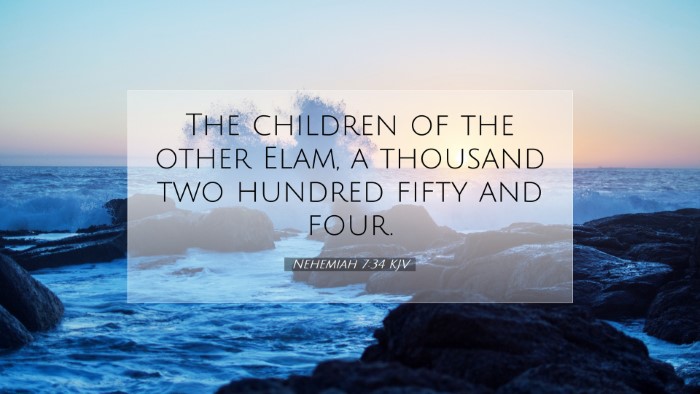Commentary on Nehemiah 7:34
Nehemiah 7:34 states: "The children of the other self of the priests: the children of Jedaiah, of the house of Jeshua, nine hundred seventy and three." This verse is part of a larger passage that lists the genealogies and the returning exiles from Babylon. Each name and number holds historical and theological significance.
Historical Context
Nehemiah's account occurs after the Babylonian exile, a crucial period for Israelite identity and restoration. The enumeration of the returning Jews served to reaffirm their lineage and covenant relationship with God.
Matthew Henry comments on the importance of recording these names, noting that this reflects the faithfulness of God to His people, in preserving them through dire times. The genealogies served not only as a record but also as a reminder of God’s promise to His people.
The Significance of Jedaiah
Jedaiah, mentioned in this passage, is of significant lineage—being a descendant of Jeshua, the high priest. Albert Barnes notes that priests held a vital role in Israelite society, both spiritually and communally. The inclusion of these details illustrates the restoration of both the priesthood and the worship of Yahweh in Jerusalem.
As the children of Jedaiah were counted in this congregation, it emphasizes the restoration of the Levitical order. Adam Clarke points out that this was essential for maintaining proper worship practices in the rebuilt temple.
Numerical Symbolism
The specific enumeration, nine hundred seventy and three, is more than a mere statistic. Numbers in the Bible often convey deeper meanings. In various commentaries, it is noted that numbers can symbolize themes such as completeness, restoration, or divine order.
Henry observes that the number could symbolize the complete return of the priestly line which had been dispersed. The precision in numbers suggests God's meticulous care in re-establishing His people and their worship.
Theological Implications
This verse invites deeper theological reflection regarding the nature of identity and community within the body of believers. The emphasis on priestly lineage underscores the idea that worship is conducted through designated mediators.
Barnes highlights that just as the priests’ line was preserved, believers today can see themselves as part of a spiritual lineage, marked by Christ's priesthood, which offers direct access to God without needing a human intermediary.
Restoration and the People of God
The restoration theme is prevalent; Nehemiah was not just focused on the physical rebuilding of the walls of Jerusalem but also on the spiritual restoration of God’s people. The community had to be reminded of their heritage, roles, and responsibilities. Adam Clarke emphasizes that this meticulous account serves as a reminder that God cares not only for individuals but also for the community as a whole, indicating the importance of each individual’s contribution to the collective.
Application for Today
For pastors and theologians, Nehemiah 7:34 provides a poignant reminder of the value of heritage and identity in our faith communities. Today's church functions similarly in preserving a legacy of faith and worship through its members. It calls for an evaluation of how well congregations nurture their identity and the roles designated within the church.
Matthew Henry encourages contemporary believers to see the necessity of being rooted in the faith, just as the priests were rooted in their lineage and service. He notes that this assures that congregations remain connected to the historical truths of their faith.
Conclusion
Nehemiah 7:34 holds essential insights for understanding God's faithfulness and the importance of identity within the community of faith. Through the lens of historical context, theological reflection, and practical application, this passage invites both introspection and action.
In summary, the study of this passage emphasizes the importance of each member in God's covenant community, reminding us that we are all integral parts of a larger story that God is telling through history—reassuring us of His continued work in our midst.
Key Takeaways:
- God's faithfulness is evident in the preservation of His people.
- The priesthood played a crucial role in the restoration of worship.
- Numbers signify more than quantity; they symbolize completeness and divine order.
- The call to nurture community identity is essential for spiritual health.
- Each believer contributes to the overall mission and identity of the Church.


